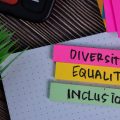
Men and black and ethnic minority social workers are disproportionately likely to fail their assessed and supported year in employment (ASYE), Skills for Care figures have revealed.
From 2018 to 2021, 3.2% of black and ethnic minority social workers failed to complete their ASYE, compared with only 0.9% of white social workers.
In the same period, 4.4% of men failed to complete their ASYE, compared to only 1.2% of women.
Black and ethnic minority men had an even higher failure rate of 8.1% in Skills for Care’s data, which covered both the children’s and adults’ ASYEs. Of all the social workers who failed to complete their ASYE, 24% were black and ethnic minority men, despite them making up just 5% of the overall sample.
Overall, 98.8% of newly qualified social workers passed their AYSE from 2018 to 2021.
The figures are a more comprehensive analysis of the issue of disproportionate ASYE failure rates by race than those provided in Skills for Care’s annual report on the children’s ASYE, published earlier this year.
This found that, in 2018-19, black and ethnic minority children’s social workers accounted for 53% of ASYE fails, despite making up only 26% of those registered under the programme.
Plan to make inclusion ‘cornerstone of programme’
On the back of the latest figures, Skills for Care, which manages the ASYE programmes on behalf of the government, said it would seek to address the higher failure rates for men and black and ethnic minority social workers.
Graham Woodham, Skills for Care’s head of regulated professional workforce, said his organisation needed to do more to make the ASYE programme “as inclusive as possible”.
Skills for Care plans to gather more data through its online portal from employers providing ASYE programmes, its annual ASYE survey and its 360˚ evaluation tool, which gathers feedback from participants and those running programmes. It also said it would gather qualitative feedback from newly qualified social workers and assessors through quality assurance and peer review visits to ASYE programmes.
The organisation also pledged to make inclusion ”the cornerstone of the programme”, including in its updates to ASYE paperwork and the evaluation criteria.
Woodham added: “Gathering the extra data will not only help us identify how NQSWs can be better supported through their ASYE, but where we can improve the experience of those on the programme and the experienced social workers who are supervising and assessing those new to the profession.”
Employers urged to have difficult conversations
Following its annual report on the children’s programme, earlier this year, Skills for Care called on employers to:
- Ensure that NQSWs and supervisors had the necessary training and support to enable them to call out racist practices.
- Ensure that NQSWs from black and ethnic minority backgrounds were linked into peer support groups if this was their choice.
- Encourage “hard to have” conversations, where individuals are not afraid to say the wrong thing and learn from the ensuing dialogue, took place at the outset of the ASYE and keep them on supervision and team meeting agendas throughout.
- Consider how to capture and analyse data around ethnicity, recruitment, achievement and attrition, and incorporate this, along with feedback from NQSWs, into the quality assurance process.
- Ask how the ASYE programme could develop an ethos of allyship, and what more action could be taken to tackle conscious and unconscious biases that result in black and ethnic minority NQSWs having worse outcomes than white colleagues on the programme.
‘Structural inequality’
The British Association of Social Workers praised newly qualified social workers for achieving a 98.8% pass rate from 2018 to 2021, despite some having had to undertake the programme during the Covid-19 pandemic.
“With disrupted training years and entering an environment where caseloads are high and backlogs deep due to the pandemic, this new intake will need additional support than normal in their first years in social work,” said BASW England professional officer Rebekah Pierre.
But she said lower pass rates for black and ethnic minority workers were concerning and highlighted “the structural inequality clearly present in the sector”.
“Social work leaders and organisations must respond with meaningful and tangible actions to prevent already marginalised social workers from being unfairly targeted and disadvantaged,” Pierre added.
Related articles
- Black and ethnic minority social workers have disproportionately high ASYE failure rate, figures show
- Black and ethnic minority social workers disproportionately subject to fitness to practise investigations
- White children’s leaders ‘must play bigger role’ in tackling racial inequalities in management
While she welcomed Skills for Care’s pledge to make inclusion a cornerstone of the programme, she said that there was “no mention of embedding the voices of Black and minoritised social workers in doing so”
“If the ‘sector experts’ are not from diverse backgrounds, we fear the results will continue to be the same,” Pierre added.
‘Diversity matters’
The Association of Directors of Children’s Services (ADCS) similarly said it was encouraging that so many social workers passed their ASYEs from 2018 to 2021, but urged employers to address the lower pass rates achieved by male and black and ethnic minority social workers.
“Diversity in the workplace matters because representation matters, this is true for both direct work with families and at a senior level,” said Rachael Wardell, chair of ADCS’ workforce development policy committee.
“We welcome efforts by Skills for Care to tackle this issue by making the programme as inclusive as possible.
“There is a role for all of us not only to encourage diversity within our workforce but also to create a culture that allows everyone to reach their full potential.”
The Association of Directors of Adult Social Services (ADASS) said it was good that it was important to address the disparities in ASYE pass rates to keep more social workers in the profession.
“While failure rates are relatively low across the board, which should be stressed, there nevertheless appears to be significant variance by ethnicity and gender that, if tackled, could stop people being lost to the profession,” a spokesperson said.
“We need every social worker we train.”
A Social Work England spokesperson said it looked forward to “working with the sector on how to address some of the questions the research has raised”.





 Bournemouth, Christchurch and Poole
Bournemouth, Christchurch and Poole  Hampshire County Council
Hampshire County Council  Lincolnshire County Council
Lincolnshire County Council  Norfolk County Council
Norfolk County Council  Northamptonshire Children’s Trust
Northamptonshire Children’s Trust  South Gloucestershire Council
South Gloucestershire Council  Wiltshire Council
Wiltshire Council  Wokingham Borough Council
Wokingham Borough Council  Children and young people with SEND are ‘valued and prioritised’ in Wiltshire, find inspectors
Children and young people with SEND are ‘valued and prioritised’ in Wiltshire, find inspectors  How specialist refugee teams benefit young people and social workers
How specialist refugee teams benefit young people and social workers  Podcast: returning to social work after becoming a first-time parent
Podcast: returning to social work after becoming a first-time parent  Podcast: would you work for an inadequate-rated service?
Podcast: would you work for an inadequate-rated service?  Family help: one local authority’s experience of the model
Family help: one local authority’s experience of the model  Workforce Insights – showcasing a selection of the sector’s top recruiters
Workforce Insights – showcasing a selection of the sector’s top recruiters 

 Facebook
Facebook X
X LinkedIn
LinkedIn Instagram
Instagram
Every article on racism in social work should make reference to the work of Wayne Reid. No excuses Community Care.
I had an over zealous practice educator (female) in my third year who felt she had to ‘screen all referrals to check for gender appropriateness’ as I was a male. She also told me she had to find at my mid way that I ‘didn’t achieve’ an outcome as she had to write a reflective paper about supporting me to overcome an academic barrier for her Prac Ed course. I’m a male. I already had a degree and a masters before embarking on my social work course and had never had any academic barriers with my two previous degrees. I later went on to achieve another masters and graduated top of the class and 4 years later I’m now a team manager. I think the elephant in the room is discrimination against males who enter the profession, and that’s systemic within the system sadly.
Yes, as a male social worker I can see with with that and I can add that I moved to England from Ireland to study social work and I had a white, female, middle class English practise teacher who marked down an assignment on racism because I made the ‘ludicrous’ claim that working class Irish people suffered racism in the UK..
This issue has been known about for years, and nothing has ever been done about it. For a profession that’s supposedly meant to champion the rights of the oppressed and challenge the status quo apropos those facing structural inequality, it is inordinately racist! I’m certain numerous Black and ethnic groups can attest to this. The solution: critical race theory lessons to all coming into this profession. Being taught about intersectionality isn’t enough. And, much sterner action must be meted for those perpetuating prejudice in workplaces as it’s not so much, what’s said to minorities faces, but attitudes that serve to limit access to opportunities. Moreover, people in positions of power must stop acting like minorities have a ‘chip on their shoulders’ as this too is patronising, as this acts to lessen my experience of what I inform you I’m experiencing!
Who knew that we just needed that extra bit of training to “call out” racism? Skills for Care don’t get it, ADCS don’t get it, BASW don’t get it. The experiences of black social workers is the sharp end of what is now a process driven authoritarian national culture. The crude racism that comes with it exposes more sharply how toxic it is. As ever it takes what black people go through to shine a light. Telling isn’t it that our leaders and our self aggrandising professional association are so thrilled that Skills for Change aspire to make “inclusion a cornerstone.” That they are enthused by an aim so basic it shouldn’t even be part of social work discourse but just be and are bought with so little is shameful. I have no words for vacuity of SWEs comment.
Apparently planet earth isn’t flat.
Well we all know that BAME social workers are unfairly targeted, bullied, harassed, victimised & discriminated against in the social care system!
Maybe so Jason but we should also be told what BASW did when it was told white managers withheld PPE from black social workers. That’s racism too isn’t it?
Definitely so Grace. You’re right about BASW. It’s clear that without Wayne Reid they are just a waste of time.
Finally! It is so saddening that it takes numbers/statistics etc for organisations to wake up about these day to day issues that affect black and minority social workers. Shameful, really. Anyway, I am just glad that figures are coming out to show what I have and my peers always thought and felt. Personally, my experience was direct, with a white manager and an Asian deputy manager who were set on wanting to fail me despite by building a Mon existent case about the quality of my work. Thank God, I had a good childhood to make me a strong, resilient, person who can stand up to them. What about my colleagues who didn’t have these qualities and ended up giving up?? No matter how beautifully the figures are presented, the words are crafted, Racism in Social Work is real. How are we going to change the staus quo? It is upto us to call is out, it is upto the senior leadership to call it out and put Real strategies in addressing it. I only hope that BME individuals are involved in this change rather than glossing over policies by words, and bringing in “experts” who have never lived the experiences.
I have been raising this issues for years only to be totally marginalised.
Bet this won’t be mentioned by any of the “winners” at the Social Worker of the Year jamboree.
The chair of the awards has called to “tackle discrimination in our society”. See Peter Hay on twitter @socialworkaward
Unless I am reading the wrong tweet by Mr Hay, I’m his afraid his words don’t cut it or me. We don’t want yet more words asking someone else to do the job. If ‘leaders’ are serious about tackling discrimination they can start by getting their graft in.
If there is disproportionate numbers of a certain background (age, race, gender, class, disability etc) represented in a cohort experiencing negative outcomes, is this automatically due to discrimination or is it possible that there other factors at play?
Such as?
Some careers attract different calibres of people depending on backgrounds – higher achievers may go for more lucrative or higher status jobs, the career is more suited to people from a certain demographic, cultural expectations and importance within role, just happens to be the make-up of people underperforming in roles, positive discrimination at an earlier point in the career path or even just too small an amount to make it statistically significant. The list could go on.
OK, so it’s all due to non-white workers and men being given a leg up into social work even though they lack the aptitude for the work? Not the social work taught in universities which is ill suited to the realities of practice? Not the bureaucracy which doesn’t tolerate on the job learning? Not a culture which rather than nurturing NQSWs promotes a sink or swim “resiliance” expectation? Not an intolerance of curiosity? Not otjering and belittling non-white and male workers? Not a racism which is so ingrained that pointing to it results on social.workers of colour being labelled not up.to the job? Could any of those have a bigger bearing than the ‘wrong calibre’ of people slipping through because of misguided positive discrimination?
All of those factors apart from the last two would impact equally on NQSW of all backgrounds. However, articles like this and many people’s responses jump to the conclusion that it must be discrimination and racism rather than exploring the weight of factors. I think higher calibre men are attracted to different careers for a variety of reasons (pay, status, power) and therefore the quality of male entrants is likely to be overall of poorer quality than women. I say this as a man.
All I would argue for is an exploration of WHY we have these figures, not jumping to conclusions, as it can actually be harmful to supporting people better.
Dr Aseem Malhotra Consultanr Cardiologist, “The reasons for excess BAME deaths amongst NHS staff are multifactorial but all rooted in the same cause. The message should be out and clear. Racism kills.” Still claim to be the ‘champions’ of social workers BASW?
Having been a sessional worker I can assure you the last thing B.A.S.W. cares about is social workers.
Agree with all the above
It’s like with SCRs when they say “lessons will be learned”
The “findings” are not new -the same rhetoric prevails. Ask any practitioner about their experiences and it reveals the same elements irrespective of length of service or level,
I expect lottery ticket sales continue to increase
Nothing has been done so far black Social workers are being failed even students on placement, even when you get in touch with the Union nothing is done .We are being failed through lack of support and racism no matter how hard working you are. We need action not just talking and writing Please something needs to be done.
Totally agree Myness it is one of the scandal of the modern day why racism in social work has not been identified.
Social work is arguably one of the most, if not THE most self-reflective of professions and many would celebrate that specific characteristic. For many years in the pages/web-pages of Community Care and other associated media, there have been ever-increasing reports of one or more types of racism associated with the profession specifically in terms of its impact on its OWN practitioners despite countless awareness-raising initiatives, policies and training materials and programmes. The question MUST be asked as to why, according to all the reports over these many years, do these measures apparently continue to be so ineffective? Have these measures been subjected to ANY form of review to establish why they’re so ineffective?
Assuming that racism is the only reason for these negative outcomes (there is no suggestion in any of the reports to the contrary), who exactly are the people who are acting in a way which is apparently having such a detrimental impact on social workers from an ethnically non-white background? In the light of Sophia’s comment above, what is the demographic background of the people acting in this way? By definition, social work is made up primarily of people with social work qualifications so the blame surely cannot be laid at the door of anybody else.
On the basis of the negative publicity generated by these reports of discrimination within social work, what could possibly attract prospective graduates who are not white (and with reference to this latest report, who are male) into the profession?
That is because Social Work is institutionally racist. I put in a request under the f.o.i. Act to HCPC several years back around 2016 in relation to number of workers from ethnic backgrounds facing conduct and capability proceedings only to be informed H.C.P.C. did not record ethnic backgrounds,Why on earth are the Unions not raising the issue of a disproportionate number of people from ethnic backgrounds facing conduct and capability issues?
You shouldn’t believe every claim made for social work by those who think they represent social work . This is a profession with no end of self defined leaders, advocates, champions with a next to pointless Regulator and in BASW a virtue signalling ineffectual shell of an association. Blogs and tweets about compassion, reflection, passion, commitment ‘activism’ and the rest, salivated over by mates, doesn’t make any of their claims real. Organisationally social work is tokenism driven. Ofcourse it has to say that justice and equality is its bedrock. But in reality wittering on without getting hands dirty is what gets you that PSW promotion, the honorary lectureship, the MBE, the ‘profile’, the award dished out by pals, the RTs, the keynote speaker invitation and all the other accolades that always trump our real work. Make a name by questioning language you never really define, spout about relationship based social work but close your eyes to the bureaucracy that makes it impossible, talk about racism while proudly displaying your MBE, rail against racism but always respond that yet another survey is needed to understand how ‘best’ to tackle it, promote your practice educator credentials but have nothing to say about who is failing their ASYE and why, the list goes on and on. No amount of anti-racism training, awareness initiatives, anti-discrimination policies and “commitment to” blather didn’t, won’t and can’t make it an equal playing field. Unless all the people with the actual power to make change get knee deep into the goo of racism to dismantle the structures that they and their peers benefit from, whatever they say, who ever they commission, will make zero impact. This is social work reality. Sadly SWE, BASW, Unison and all the other ‘names’ are part of the miasma that perpetuates the guff. Social workers need to believe in ourselves, we have no leaders who can do it for us.
Thanks for this debate. We did not learn this in university and was not told as BAME we were not of the right calibre! Having worked for many years within a council, I have seen the constant institutional racism and am sad to see it exists in social work. I have no confidence in the union to support BAME social workers and wait to see if SWE will make a difference. I remember attending a session, this year, for The social care workforce race and equality standard (SCWRES) officially launched on 1 April 2021 across 18 local authorities (LAs), the first phase of a timely and crucial programme committed to improve anti-racist and anti-discriminatory practices throughout the sector. However, still waiting to hear what difference they will make as they asked the same equality questions we have been asking since equalities was raised many years ago. In my opinion, there’s been alot of talk and little change.Yes we need to work with newly qualified social workers to ensure they can succeed and remain as social workers; including career development advice. No one has asked me to feed back on the ASYE.
On a positive note I’ve met some outstanding male and female BAME social workers and we would benefit from their experience and input, notwithstanding, I acknowledge and thank those who are managers, writers and tutors for their valued contribution. Still we Rise !
I have had 2 ASYE candidate both of them white very academic, with degrees, PHD’s and masters of various sort behind them, and a few assimilated within the mental health services when qualified all of them White. As a Manager i have felt intimidated by a few of them.anti-racist and anti-discriminatory , do they know about this one of the qualified workers in my opinion is racist and knows how to play the system, and as a Black person you KNOW!
I think some of them are too academic , who don’t want to get down to the nitty gritty task of social workers, all want to be managers
Recently we have had a new cohort of ASYE , 1 Black candidate, who from my understanding was excellent but was dismissed because she would not take the Covid Vaccine . ( that’s for another discussion).